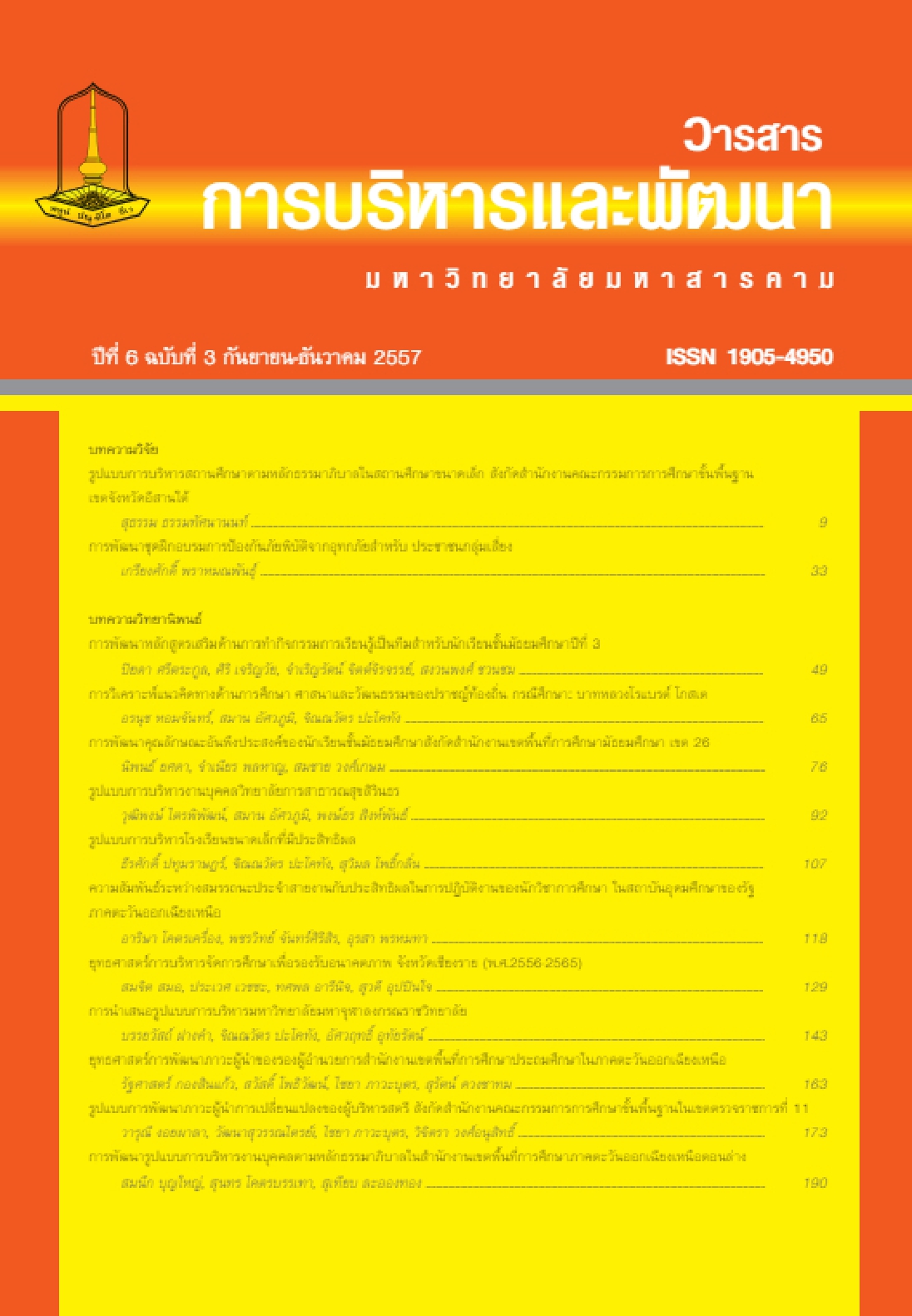The Relationship between Functional Competency and Effectiveness Performance of the Educators at Public Universities in the Northeast
Main Article Content
Abstract
This research aimed to 1) examine functional competency of the educators at public universities in the northeast, 2) study the relationship between functional competency and effectiveness performance of the educators at public universities in the northeast, and 3) find out the prediction equations of functional competency that influenced effectiveness performance of the educators at public universities in the northeast. The samples were 365 educators from eight universities in the northeast region. They were selected through the stratifiedrandom sampling technique. The research tools consisted of ranking questionnaires and five-level rating scale questionnaires, with discrimination ranging from 0.31 to 0.86 and reliability of 0.96. The statistics used included percentage, mean, standard deviation and stepwise multiple regression analysis.
The findings revealed that:
1. Educators’ opinions about functional competency, in overall and individual aspect considerations, were at the high level. Their opinions about the aspects of functional competency arranged in order from the highest to the lowest score were as follows: analytical thinking (X1), organizational awareness (X4), proactiveness (X3), concern for order (X2), and conceptual thinking (X5). Overall consideration suggested that their opinions about effectiveness performance were rated at the high level. Individual aspect consideration revealed that all aspects of effectiveness performance were also rated at the high level including punctuality, workload, and quality of work-- arranged from the highest to the lowest score.
2. According to the relation analysis, functional competency concerning the aspects, namely, concern for order (X3), proactiveness (X2), organizational awareness (X4) and analytical thinking (X1) had positive relation with effectiveness performance of the educators at public universities in the northeast at the.01 level of significance. The correlation coefficients of these four aspects were 0.763, 0.726, 0.725 and
0.716, respectively.
3. The variables that best predicted the effectiveness performance of the educators were concern for order (X3), analytical thinking (X1), organizational awareness (X4) and proactiveness (X2). The prediction equations could be shown as the following.
Raw Score Regression Equation
Y/ = .483 + .326 X3 + .224 X1 + .227 X4 + .129 X2
and Standardized Score Regression Equation
Z/Y = .331 Z3 + .223 Z1 + .213 Z4 + .127 Z2
Downloads
Article Details
References
Armart, S. (2007). The relationships between Good Memberships of the Organization and Work Performance Effectiveness of Saving and Credit Cooperative Accountants in Thailand. Master of Accountancy, Mahasarakham: Mahasarakham University.
Chansiri, W. (2008). Developing Core Competencies of Supporting - Line Administrators at Public Universities. Doctor of Education, Mahasarakham: Mahasarakham University.
Chansirisira, P. (2011). Developing Administrate Competency. Mahasarakham: Mahasarakham University.
Charoenwongsak, K. (2006). Conceptual Thinking. 7th. Bangkok: Success Media.
Jamrog and Overholt (2004). Measuring HR and Organizational Effectiveness. Employment Relations Today. 31 (2) : 33–45 ; July.
Jongjroen, V. (2008). Factors Related to the Performance Efficiency of Municipality Administration Organizations in Pathumtani Provice. Master of Public Administration in Local Government, Khon Kaen: Khon Kaen University.
McCann, J. (2004). Organizational Effectiveness: Changing Concepts for Changing Environtments. Human Resourc Planning. 27 (1): 43,48.
Office of the Civil Service Commission (2010). Competency Manual. Bangkok: P. A. Living Co.,Ltd.
Piriyathanalai, S and Thephasadin na Ayudhya, J. (2010). Competency Competency Understand - Usable- Practical. Bangkok: Signaturesolutions.
Pinitkarn, S. (2009). Reletionships between Core competency and Efficiency Performance of the Accountants in Excise Department. Mater of Accountancy, Mahasarakham: Mahasarakham University.
Plubkajorn, S. (2010). A Correlation Between the Result of Team Learning and Personnel Competency Development at Samitivej Sukhumvit Hospital. Master of Education, Bangkok: Ramkhamhaeng University.
Thongjub, C. (2009). Competency Model for Workforce Development in the Workplace. Master of Curriculum Research and Development, Bangkok: King Mongkut’s University of Technology North Bangkok.


